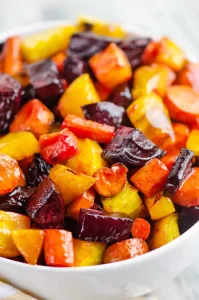
Celebrity Master Chef Dr Kaviraj Khialani
Introduction
Healthy root vegetables are a diverse group of edible plants that store essential nutrients underground. They are not only delicious but also offer numerous health benefits. These vegetables include staples like carrots, sweet potatoes, and beets, as well as less common varieties like parsnips, turnips, and rutabagas. Packed with vitamins, minerals, and dietary fiber, root vegetables promote good digestion, boost the immune system, and provide a reliable source of energy. Their versatility in cooking makes them a valuable addition to any balanced diet, and their natural sweetness adds a delightful flavor to a wide range of dishes. In this discussion, we will explore the nutritional advantages, culinary uses, and cultivation of these nutrient-rich vegetables.
How are root vegetables healthier?
Root vegetables like carrots, sweet potatoes, and beets are often considered healthy because they offer several nutritional benefits:
Nutrient-rich
Root vegetables are a good source of essential nutrients, including vitamins (like vitamin A, C, and B vitamins) and minerals (such as potassium, magnesium, and iron).
High in fiber
They contain dietary fiber, which can aid digestion, promote a feeling of fullness, and help regulate blood sugar levels.
Low in calories
Most root vegetables are relatively low in calories, making them a healthy option for those looking to manage their weight.
Antioxidants
Many root vegetables contain antioxidants, which help protect cells from damage and may reduce the risk of chronic diseases.
Complex carbohydrates: They provide a steady source of energy due to their complex carbohydrates, which are less likely to cause rapid spikes in blood sugar.
Low in fat
Root vegetables are naturally low in fat, making them a good choice for a balanced diet.
7 most commonly used root vegetables in cooking
Potatoes: One of the most widely consumed root vegetables, known for their versatility in cooking.
Carrots: Often used in salads, soups, and as a side dish. They are rich in vitamins and antioxidants.
Onions: Although not typically eaten on their own, onions are a fundamental ingredient in many dishes, providing flavor and aroma.
Garlic: Like onions, garlic is used to enhance the flavor of various dishes and is also valued for its potential health benefits.
Sweet Potatoes: A nutritious and sweet root vegetable often used in both savoury and sweet recipes.
Beets: Known for their vibrant colour and earthy flavor, beets can be used in salads, roasted, or even as the main ingredient in borscht soup.
Turnips: These have a mild, slightly peppery flavor and are used in stews, soups, and mashed as a side dish.
Health benefits of root vegetables
Nutrient Density: Root vegetables are rich in essential nutrients like vitamins (A, C, K), minerals (potassium, folate), and dietary fiber.
Low in Calories: They are relatively low in calories, making them a nutritious choice for weight management.
Digestive Health: The fiber in root vegetables supports healthy digestion and regular bowel movements.
Antioxidants: Many root vegetables, such as carrots and sweet potatoes, contain antioxidants that help protect cells from damage.
Heart Health: Potassium in root vegetables can help regulate blood pressure and support heart health.
Immune Support: Vitamins like vitamin C in root vegetables can boost the immune system and help the body fight off infections.
Blood Sugar Management: Some root vegetables have a low glycemic index, which means they release glucose into the bloodstream slowly, aiding in blood sugar control.
Reduced Risk of Chronic Diseases: Regular consumption of root vegetables is associated with a reduced risk of chronic conditions like heart disease and certain cancers.
Eye Health: Carrots, in particular, are known for promoting good vision due to their high vitamin A content.
Satiety: The fiber and complex carbohydrates in root vegetables help keep you feeling full and satisfied, reducing the likelihood of overeating.
Versatility: They can be prepared in numerous ways, making it easy to incorporate them into a balanced diet.
Skin Health: The vitamins and antioxidants in root vegetables can contribute to healthy skin.
Gluten-Free: Many root vegetables are naturally gluten-free, making them suitable for individuals with gluten sensitivity or celiac disease.
Use of root vegetables in day-to-day cooking
Root vegetables are versatile and can be used in various ways in day-to-day cooking:
Roasting: Roast vegetables like potatoes, carrots, beets, and parsnips with herbs and olive oil for a delicious side dish.
Mashed: Create creamy mashed potatoes, sweet potatoes, or rutabagas as a classic side dish.
Soups: Use root vegetables like carrots, onions, and celery as a base for soups and stews.
Fries: Make healthy oven-baked vegetable fries from sweet potatoes, carrots, or parsnips.
Gratin: Layer thinly sliced root vegetables in a creamy sauce and bake for a gratin dish.
Casseroles: Add diced root vegetables to casseroles or one-pot dishes for extra flavor and nutrition.
Salads: Shred or julienne root vegetables like carrots and beets to add colour and crunch to salads.
Stir-Fries: Include sliced or julienned root vegetables in stir-fries for a hearty, crunchy element.
Sauces: Blend roasted root vegetables into a sauce for a natural sweetness and creaminess.
Sweets: Bake sweet potato or pumpkin pies and other desserts with root vegetables.
Snacks: Make homemade vegetable chips by thinly slicing and baking root vegetables.
Fritters: Combine grated root vegetables with herbs and spices to make savoury fritters.
Purees: Create purees from root vegetables for baby food or as a side dish.
Pickles: Turn beets or radishes into pickles for a tangy side or condiment.
Smoothies: Blend sweet potatoes or carrots into smoothies for added nutrients and natural sweetness.
Baking: Use pureed root vegetables like pumpkin or sweet potato in baking recipes, like muffins or bread.
Root vegetables add flavor, texture, and nutritional value to a wide range of dishes, making them a valuable staple in day-to-day cooking.
Tips to maintain nutrition while cooking root vegetables
To maintain the nutrition of root vegetables while cooking, consider these tips:
Choose Healthy Cooking Methods: Opt for cooking methods like steaming, roasting, baking, or microwaving instead of deep-frying, which can add unnecessary calories and reduce nutritional value.
Minimal Peeling: Keep the skin on whenever possible, as it contains valuable nutrients and fiber. Just be sure to wash the vegetables thoroughly.
Control Boiling Time: When boiling root vegetables, use as little water as possible and cook them for the minimum time needed to soften them. This helps prevent nutrient loss into the cooking water.
Avoid Overcooking: Overcooking can lead to nutrient loss. Cook root vegetables until they are tender but still firm to the bite.
Cut Uniformly: Cut the vegetables into uniform sizes to ensure even cooking, reducing the risk of overcooking some pieces.
Use Minimal Water: When steaming or microwaving, use minimal water to prevent excessive nutrient leaching.
Cook with the Skin: When roasting or baking, leave the skin on for added nutrients and flavor.
Season Sensibly: Minimize the use of high-calorie, high-sodium, or high-sugar seasonings that can offset the health benefits of root vegetables.
Preserve Cooking Water: If you’ve boiled root vegetables, save the cooking water to use as a base for soups or sauces, as it may contain some nutrients.
Steam Instead of Boil: Steaming root vegetables helps preserve more nutrients than boiling.
Add Nutrient-Dense Ingredients: Enhance the nutritional value of your dishes by incorporating other nutrient-dense ingredients like herbs, spices, and lean proteins.
Minimal Processing: Minimize processing, such as cutting and chopping, until just before cooking to prevent nutrient loss through oxidation.
Serve Whole: Whenever possible, serve root vegetables whole or in large chunks to reduce surface area exposed to heat and retain nutrients.
7 easy to make recipes using root vegetables
ROASTED ROOT VEGETABLES

Ingredients
2 lbs mixed root vegetables (carrots, parsnips, potatoes, sweet potatoes, beets)
2 tbsp olive oil
1 tsp salt
½ tsp black pepper
Method:
- Preheat your oven to 425°F (220°C).
- Peel and chop the root vegetables into bite-sized pieces.
- Toss the vegetables with olive oil, salt, and pepper.
- Spread them on a baking sheet and roast for 30-35 minutes or until they’re tender and slightly crispy.
MASHED POTATOES

Ingredients
250 gms potatoes
100gms parsnips or turnips
4 tbsp butter
½ cup milk
Salt and pepper to taste
Method
- Peel and chop the potatoes and parsnips/ turnips, then boil until tender.
- Drain and mash with butter, milk, salt, and pepper until smooth.
CARROT AND GINGER SOUP

Ingredients
150 gms carrots
1 small onion
2-inch piece of fresh ginger
4 cups vegetable broth
Salt and pepper to taste
Method
- Chop carrots, onion, and ginger.
- Sauté onion and ginger, then add carrots and broth.
- Simmer until carrots are soft, then blend until smooth.
SWEET POTATO FRIES

Ingredients
2 sweet potatoes
2 tbsp olive oil
½ tsp paprika
½ tsp garlic powder
Method
- Preheat the oven to 425°F (220°C).
- Cut sweet potatoes into fries, toss with olive oil and seasonings.
- Bake for 25-30 minutes, flipping halfway through.
HONEY GLAZED ROASTED BEETS

Ingredients
250gms beetroots
2 tbsp honey
2 tbsp balsamic vinegar
Salt and pepper to taste
Method
- Peel and chop beets, toss with honey, balsamic vinegar, salt, and pepper.
- Roast at 400°F (200°C) for about 30 minutes or until tender.
POTATO & LEEK GRATIN

Ingredients
4 large potatoes
2 leeks
2 cups heavy cream
1 cup grated Gruyere/ processed indian cheese
Salt and pepper to taste
Method
- Slice potatoes and leeks thinly.
- Layer them in a baking dish, pouring cream between layers.
- Top with cheese, salt, and pepper. Bake at 350°F (175°C) for 45 minutes.
INDIAN-STYLE ROOT VEGETABLES

Ingredients
Assorted root vegetables- 400 gm (potatoes, carrots, turnips, etc.)
1 onion, finely chopped
2 cloves garlic, minced
1-inch piece of ginger, grated
1 tsp cumin seeds
1 tsp turmeric powder
1 tsp garam masala
1 tsp coriander powder
Salt to taste
Cooking oil
Fresh coriander leaves for garnish
Instructions
- Peel and dice the root vegetables into equal-sized pieces.
- Heat oil in a pan, add cumin seeds, and let them sizzle.
- Add chopped onions, garlic, and ginger. Sauté until the onions are soft and translucent.
- Add the root vegetables, turmeric, coriander powder, and salt. Mix well.
- Cover and cook on low heat until the vegetables are tender, stirring occasionally.
- Once the vegetables are cooked, sprinkle garam masala and garnish with chopped coriander.
- Serve hot with rice or Indian bread.
Conclusion
In conclusion, root vegetables are a valuable and versatile category of foods that offer numerous benefits in terms of nutrition, flavor, and culinary possibilities. These earthy gems provide essential vitamins, minerals, fiber, and antioxidants, supporting overall health and well-being.
Whether roasted, mashed, boiled, or incorporated into various dishes, root vegetables can be a nutritious and satisfying addition to your daily meals. Their low-calorie content, high fiber, and complex carbohydrates make them suitable for weight management and sustaining energy throughout the day.
Celebrity Master Chef Dr Kaviraj Khialani is a Mumbai-based hotel-restaurant and food consultant. He is specialised in over 33 international cuisines and has quality experience with hotels and airlines as a part of his long journey of over two decades in his chosen field. Chef Kaviraj is a renowned author, academician, food designer, writer and has also been awarded several national awards and global recognitions for his talent & outstanding achievements. Besides having been featured on several food shows on ColorsTV and Star Plus he is a mentor, coach and guide to aspiring to be future chefs and hoteliers of tomorrow.
He can be contacted at twitter: @kaviraj_chef, Mobile: 91 9820939336. Mail: chefkaviraj249@gmail.com
Also Read:
Also Read:













